University Assignment: Ethics, Innovation, and Motivation Analysis
VerifiedAdded on 2020/04/07
|5
|853
|63
Homework Assignment
AI Summary
This assignment explores the interconnectedness of ethics, innovation, and motivation within a business environment. It defines ethics as a system of moral principles crucial for decision-making and organizational success, emphasizing the importance of ethical behavior in meeting societal expectations and guiding employee conduct. Innovation is presented as the application of ideas to improve business processes, fostering competitiveness and survival in a capitalistic market. The assignment highlights how businesses utilize innovation to enhance practices and market position. Motivation is discussed as an internal drive that satisfies employee needs, influencing their behavior and performance. It examines how managers can improve system efficiencies by motivating employees and meeting their needs, aligning with Maslow’s hierarchy of needs. The assignment underscores the impact of motivated employees on ethical standards and overall business competitiveness, supported by references to relevant research and studies.
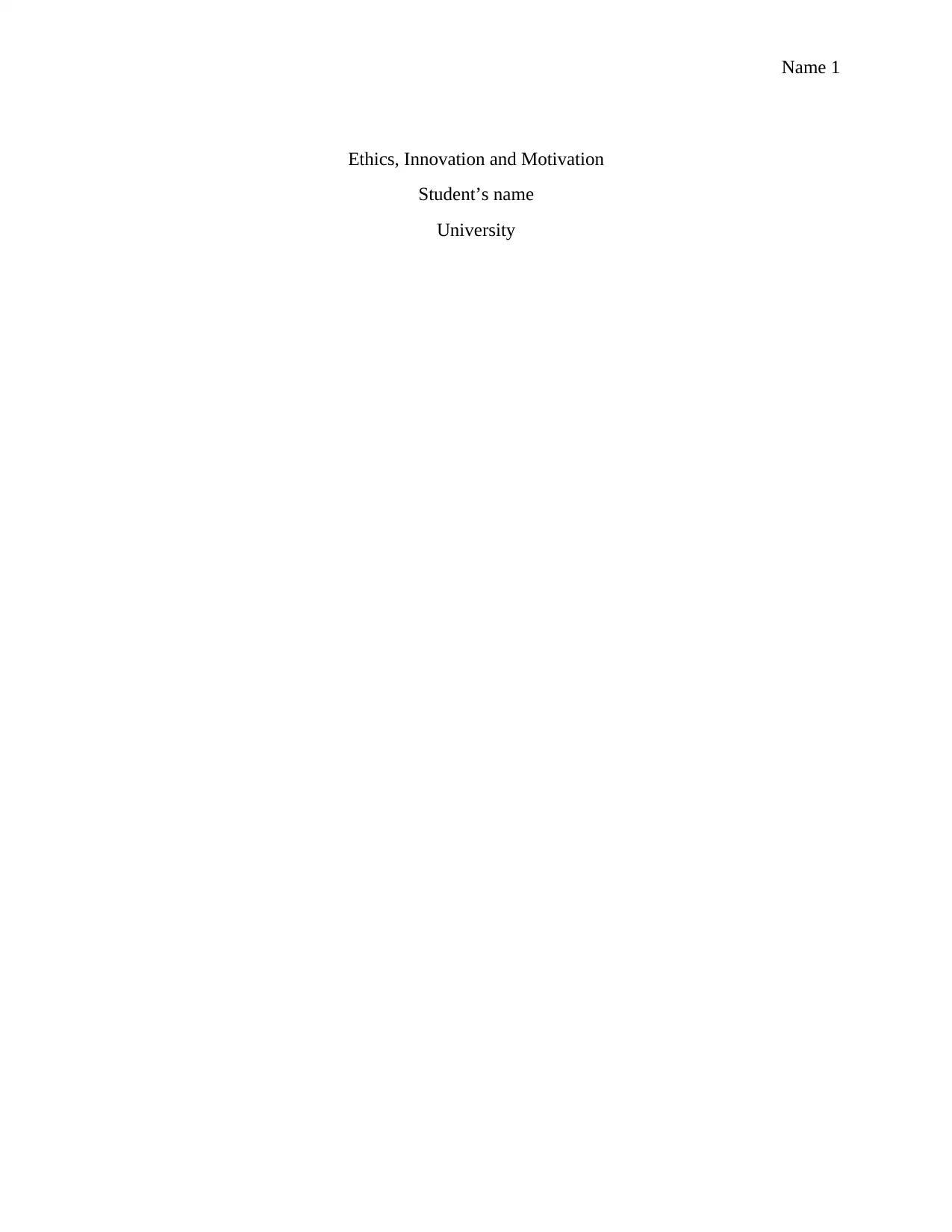
Name 1
Ethics, Innovation and Motivation
Student’s name
University
Ethics, Innovation and Motivation
Student’s name
University
Paraphrase This Document
Need a fresh take? Get an instant paraphrase of this document with our AI Paraphraser
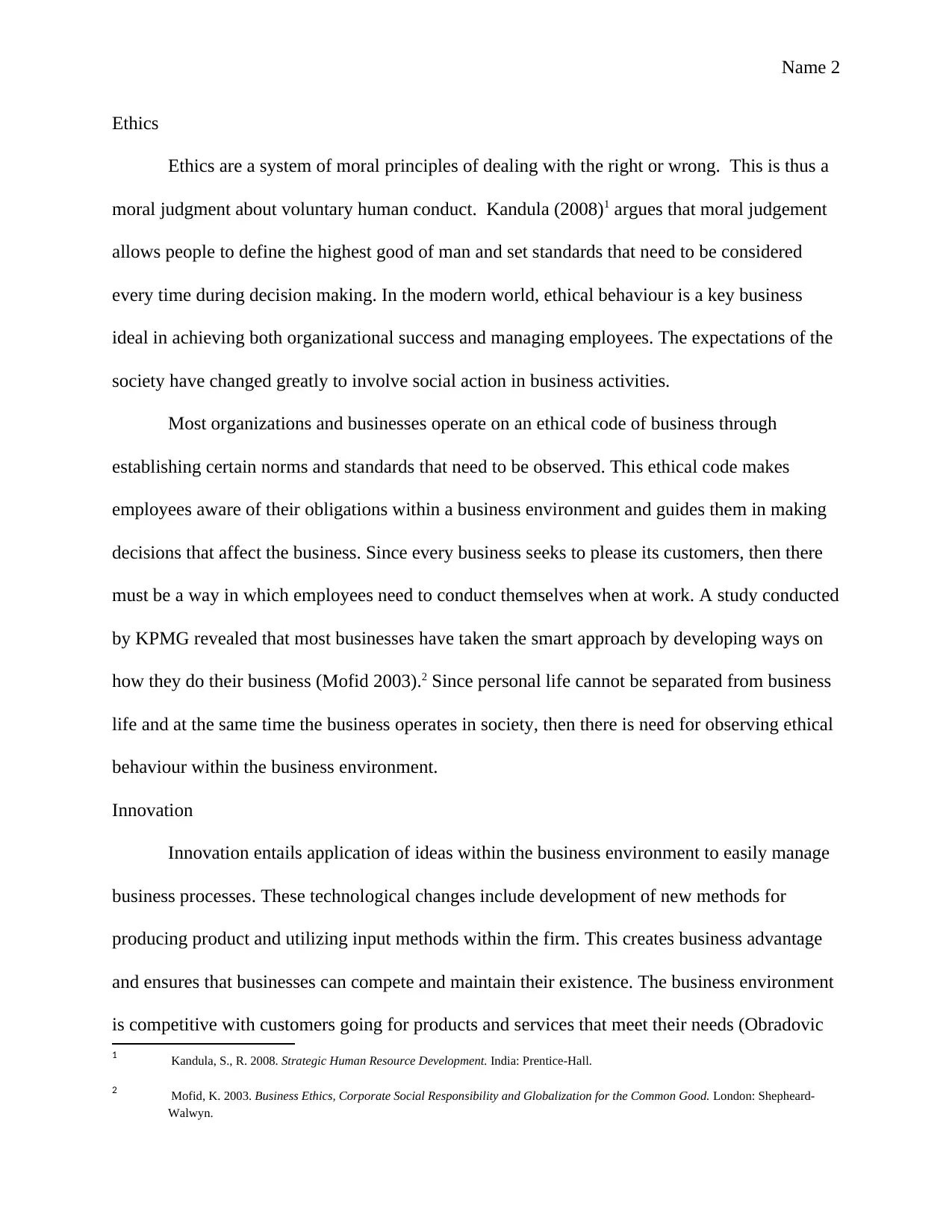
Name 2
Ethics
Ethics are a system of moral principles of dealing with the right or wrong. This is thus a
moral judgment about voluntary human conduct. Kandula (2008)1 argues that moral judgement
allows people to define the highest good of man and set standards that need to be considered
every time during decision making. In the modern world, ethical behaviour is a key business
ideal in achieving both organizational success and managing employees. The expectations of the
society have changed greatly to involve social action in business activities.
Most organizations and businesses operate on an ethical code of business through
establishing certain norms and standards that need to be observed. This ethical code makes
employees aware of their obligations within a business environment and guides them in making
decisions that affect the business. Since every business seeks to please its customers, then there
must be a way in which employees need to conduct themselves when at work. A study conducted
by KPMG revealed that most businesses have taken the smart approach by developing ways on
how they do their business (Mofid 2003).2 Since personal life cannot be separated from business
life and at the same time the business operates in society, then there is need for observing ethical
behaviour within the business environment.
Innovation
Innovation entails application of ideas within the business environment to easily manage
business processes. These technological changes include development of new methods for
producing product and utilizing input methods within the firm. This creates business advantage
and ensures that businesses can compete and maintain their existence. The business environment
is competitive with customers going for products and services that meet their needs (Obradovic
1 Kandula, S., R. 2008. Strategic Human Resource Development. India: Prentice-Hall.
2 Mofid, K. 2003. Business Ethics, Corporate Social Responsibility and Globalization for the Common Good. London: Shepheard-
Walwyn.
Ethics
Ethics are a system of moral principles of dealing with the right or wrong. This is thus a
moral judgment about voluntary human conduct. Kandula (2008)1 argues that moral judgement
allows people to define the highest good of man and set standards that need to be considered
every time during decision making. In the modern world, ethical behaviour is a key business
ideal in achieving both organizational success and managing employees. The expectations of the
society have changed greatly to involve social action in business activities.
Most organizations and businesses operate on an ethical code of business through
establishing certain norms and standards that need to be observed. This ethical code makes
employees aware of their obligations within a business environment and guides them in making
decisions that affect the business. Since every business seeks to please its customers, then there
must be a way in which employees need to conduct themselves when at work. A study conducted
by KPMG revealed that most businesses have taken the smart approach by developing ways on
how they do their business (Mofid 2003).2 Since personal life cannot be separated from business
life and at the same time the business operates in society, then there is need for observing ethical
behaviour within the business environment.
Innovation
Innovation entails application of ideas within the business environment to easily manage
business processes. These technological changes include development of new methods for
producing product and utilizing input methods within the firm. This creates business advantage
and ensures that businesses can compete and maintain their existence. The business environment
is competitive with customers going for products and services that meet their needs (Obradovic
1 Kandula, S., R. 2008. Strategic Human Resource Development. India: Prentice-Hall.
2 Mofid, K. 2003. Business Ethics, Corporate Social Responsibility and Globalization for the Common Good. London: Shepheard-
Walwyn.
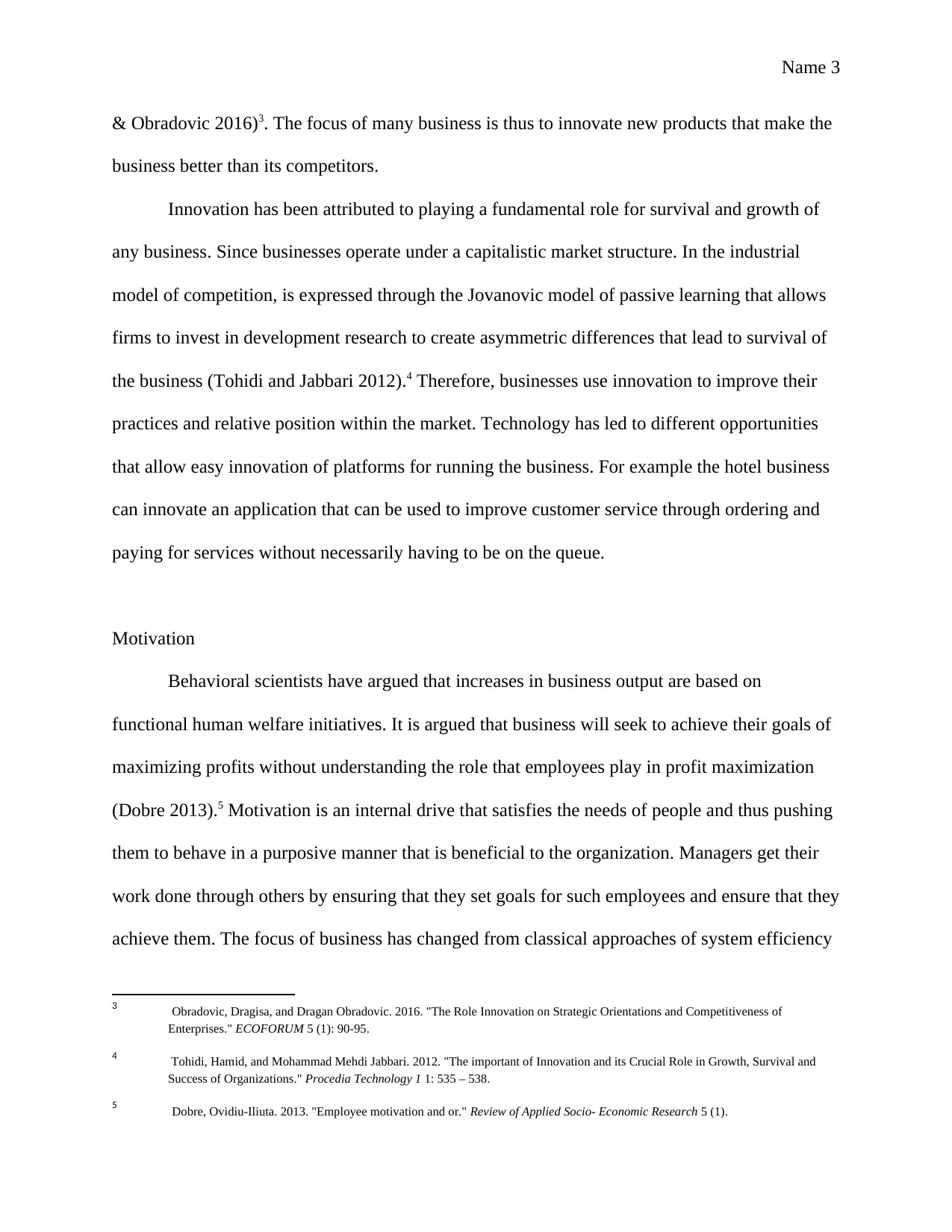
Name 3
& Obradovic 2016)3. The focus of many business is thus to innovate new products that make the
business better than its competitors.
Innovation has been attributed to playing a fundamental role for survival and growth of
any business. Since businesses operate under a capitalistic market structure. In the industrial
model of competition, is expressed through the Jovanovic model of passive learning that allows
firms to invest in development research to create asymmetric differences that lead to survival of
the business (Tohidi and Jabbari 2012).4 Therefore, businesses use innovation to improve their
practices and relative position within the market. Technology has led to different opportunities
that allow easy innovation of platforms for running the business. For example the hotel business
can innovate an application that can be used to improve customer service through ordering and
paying for services without necessarily having to be on the queue.
Motivation
Behavioral scientists have argued that increases in business output are based on
functional human welfare initiatives. It is argued that business will seek to achieve their goals of
maximizing profits without understanding the role that employees play in profit maximization
(Dobre 2013).5 Motivation is an internal drive that satisfies the needs of people and thus pushing
them to behave in a purposive manner that is beneficial to the organization. Managers get their
work done through others by ensuring that they set goals for such employees and ensure that they
achieve them. The focus of business has changed from classical approaches of system efficiency
3 Obradovic, Dragisa, and Dragan Obradovic. 2016. "The Role Innovation on Strategic Orientations and Competitiveness of
Enterprises." ECOFORUM 5 (1): 90-95.
4 Tohidi, Hamid, and Mohammad Mehdi Jabbari. 2012. "The important of Innovation and its Crucial Role in Growth, Survival and
Success of Organizations." Procedia Technology 1 1: 535 – 538.
5 Dobre, Ovidiu-Iliuta. 2013. "Employee motivation and or." Review of Applied Socio- Economic Research 5 (1).
& Obradovic 2016)3. The focus of many business is thus to innovate new products that make the
business better than its competitors.
Innovation has been attributed to playing a fundamental role for survival and growth of
any business. Since businesses operate under a capitalistic market structure. In the industrial
model of competition, is expressed through the Jovanovic model of passive learning that allows
firms to invest in development research to create asymmetric differences that lead to survival of
the business (Tohidi and Jabbari 2012).4 Therefore, businesses use innovation to improve their
practices and relative position within the market. Technology has led to different opportunities
that allow easy innovation of platforms for running the business. For example the hotel business
can innovate an application that can be used to improve customer service through ordering and
paying for services without necessarily having to be on the queue.
Motivation
Behavioral scientists have argued that increases in business output are based on
functional human welfare initiatives. It is argued that business will seek to achieve their goals of
maximizing profits without understanding the role that employees play in profit maximization
(Dobre 2013).5 Motivation is an internal drive that satisfies the needs of people and thus pushing
them to behave in a purposive manner that is beneficial to the organization. Managers get their
work done through others by ensuring that they set goals for such employees and ensure that they
achieve them. The focus of business has changed from classical approaches of system efficiency
3 Obradovic, Dragisa, and Dragan Obradovic. 2016. "The Role Innovation on Strategic Orientations and Competitiveness of
Enterprises." ECOFORUM 5 (1): 90-95.
4 Tohidi, Hamid, and Mohammad Mehdi Jabbari. 2012. "The important of Innovation and its Crucial Role in Growth, Survival and
Success of Organizations." Procedia Technology 1 1: 535 – 538.
5 Dobre, Ovidiu-Iliuta. 2013. "Employee motivation and or." Review of Applied Socio- Economic Research 5 (1).
⊘ This is a preview!⊘
Do you want full access?
Subscribe today to unlock all pages.

Trusted by 1+ million students worldwide
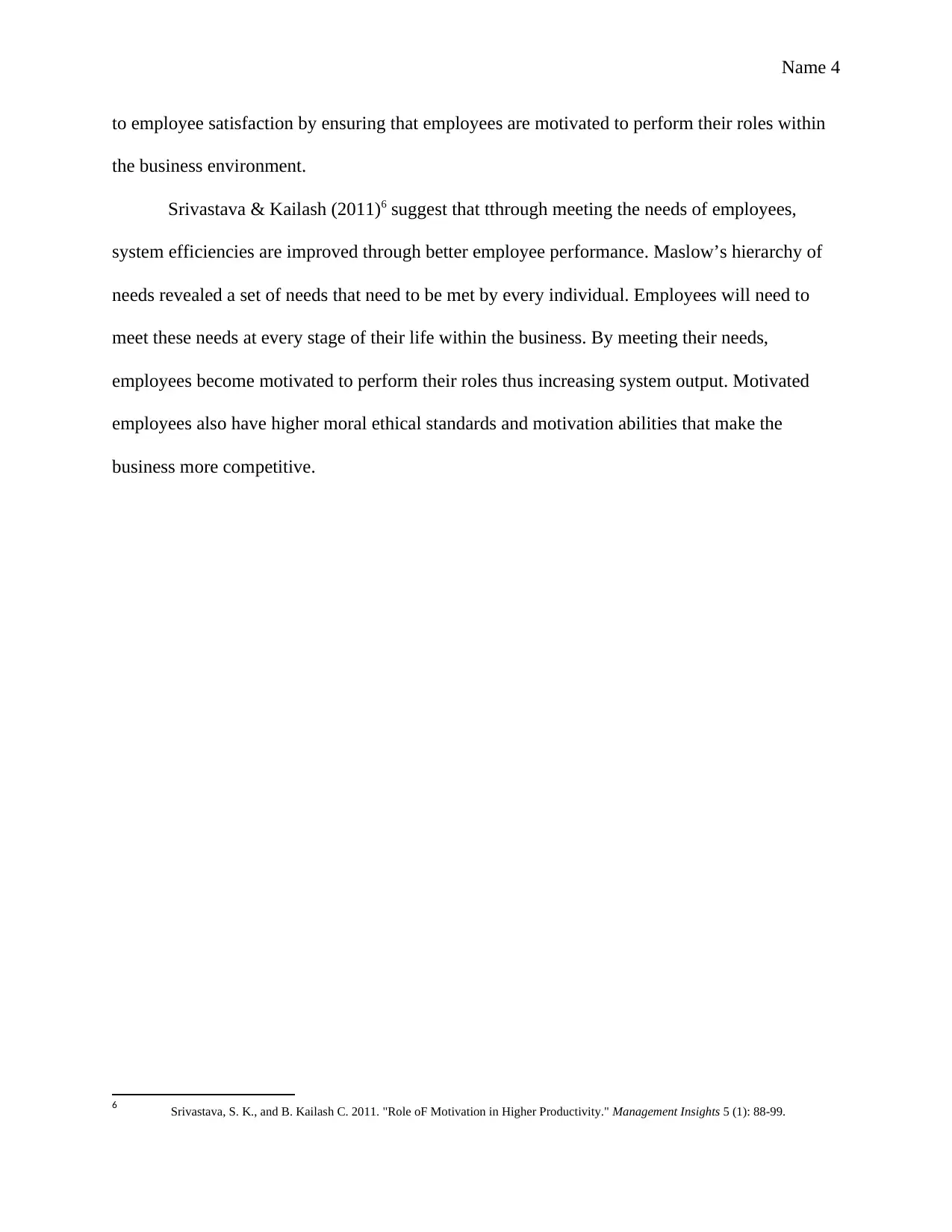
Name 4
to employee satisfaction by ensuring that employees are motivated to perform their roles within
the business environment.
Srivastava & Kailash (2011)6 suggest that tthrough meeting the needs of employees,
system efficiencies are improved through better employee performance. Maslow’s hierarchy of
needs revealed a set of needs that need to be met by every individual. Employees will need to
meet these needs at every stage of their life within the business. By meeting their needs,
employees become motivated to perform their roles thus increasing system output. Motivated
employees also have higher moral ethical standards and motivation abilities that make the
business more competitive.
6 Srivastava, S. K., and B. Kailash C. 2011. "Role oF Motivation in Higher Productivity." Management Insights 5 (1): 88-99.
to employee satisfaction by ensuring that employees are motivated to perform their roles within
the business environment.
Srivastava & Kailash (2011)6 suggest that tthrough meeting the needs of employees,
system efficiencies are improved through better employee performance. Maslow’s hierarchy of
needs revealed a set of needs that need to be met by every individual. Employees will need to
meet these needs at every stage of their life within the business. By meeting their needs,
employees become motivated to perform their roles thus increasing system output. Motivated
employees also have higher moral ethical standards and motivation abilities that make the
business more competitive.
6 Srivastava, S. K., and B. Kailash C. 2011. "Role oF Motivation in Higher Productivity." Management Insights 5 (1): 88-99.
Paraphrase This Document
Need a fresh take? Get an instant paraphrase of this document with our AI Paraphraser
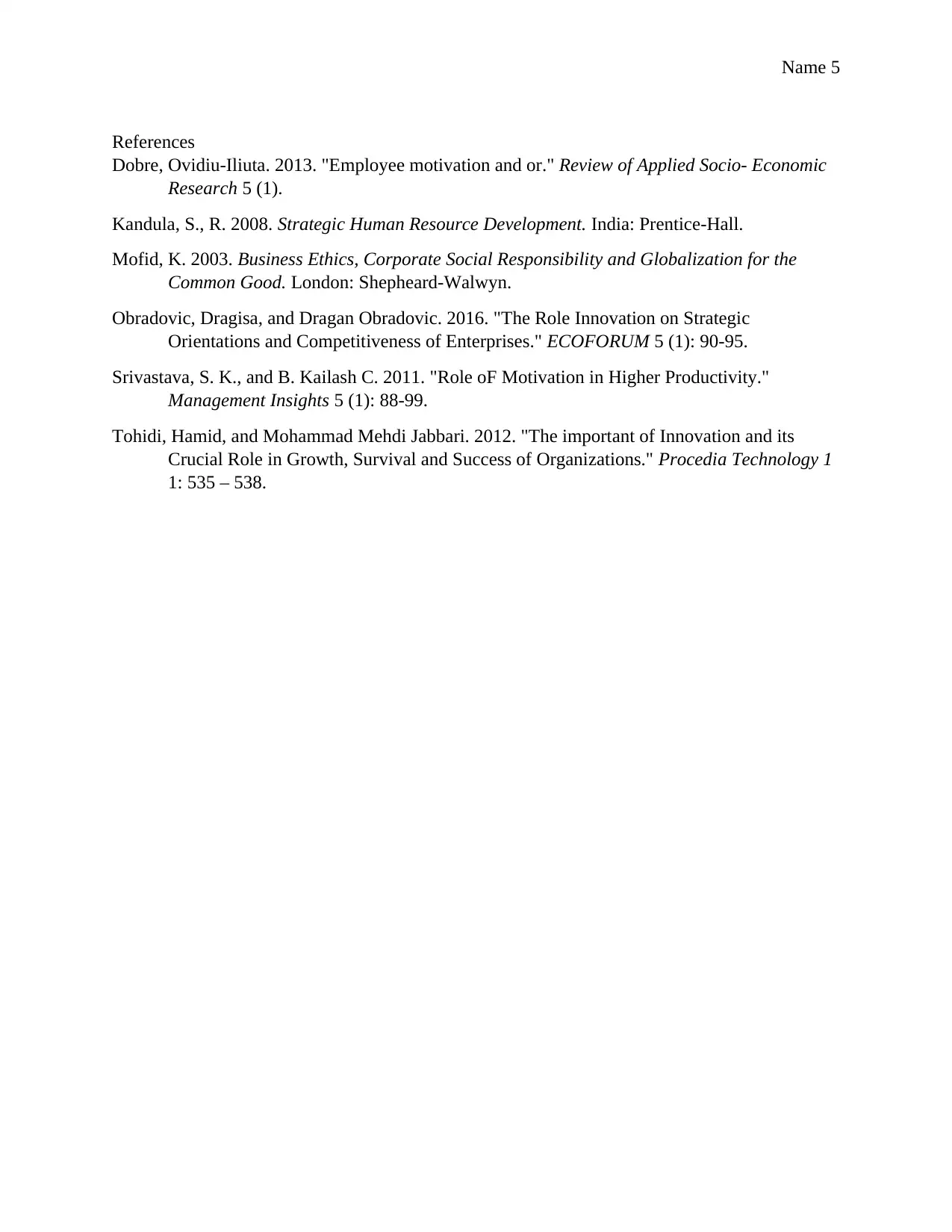
Name 5
References
Dobre, Ovidiu-Iliuta. 2013. "Employee motivation and or." Review of Applied Socio- Economic
Research 5 (1).
Kandula, S., R. 2008. Strategic Human Resource Development. India: Prentice-Hall.
Mofid, K. 2003. Business Ethics, Corporate Social Responsibility and Globalization for the
Common Good. London: Shepheard-Walwyn.
Obradovic, Dragisa, and Dragan Obradovic. 2016. "The Role Innovation on Strategic
Orientations and Competitiveness of Enterprises." ECOFORUM 5 (1): 90-95.
Srivastava, S. K., and B. Kailash C. 2011. "Role oF Motivation in Higher Productivity."
Management Insights 5 (1): 88-99.
Tohidi, Hamid, and Mohammad Mehdi Jabbari. 2012. "The important of Innovation and its
Crucial Role in Growth, Survival and Success of Organizations." Procedia Technology 1
1: 535 – 538.
References
Dobre, Ovidiu-Iliuta. 2013. "Employee motivation and or." Review of Applied Socio- Economic
Research 5 (1).
Kandula, S., R. 2008. Strategic Human Resource Development. India: Prentice-Hall.
Mofid, K. 2003. Business Ethics, Corporate Social Responsibility and Globalization for the
Common Good. London: Shepheard-Walwyn.
Obradovic, Dragisa, and Dragan Obradovic. 2016. "The Role Innovation on Strategic
Orientations and Competitiveness of Enterprises." ECOFORUM 5 (1): 90-95.
Srivastava, S. K., and B. Kailash C. 2011. "Role oF Motivation in Higher Productivity."
Management Insights 5 (1): 88-99.
Tohidi, Hamid, and Mohammad Mehdi Jabbari. 2012. "The important of Innovation and its
Crucial Role in Growth, Survival and Success of Organizations." Procedia Technology 1
1: 535 – 538.
1 out of 5
Related Documents
Your All-in-One AI-Powered Toolkit for Academic Success.
+13062052269
info@desklib.com
Available 24*7 on WhatsApp / Email
![[object Object]](/_next/static/media/star-bottom.7253800d.svg)
Unlock your academic potential
Copyright © 2020–2025 A2Z Services. All Rights Reserved. Developed and managed by ZUCOL.





